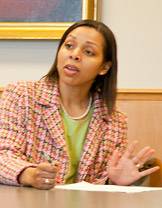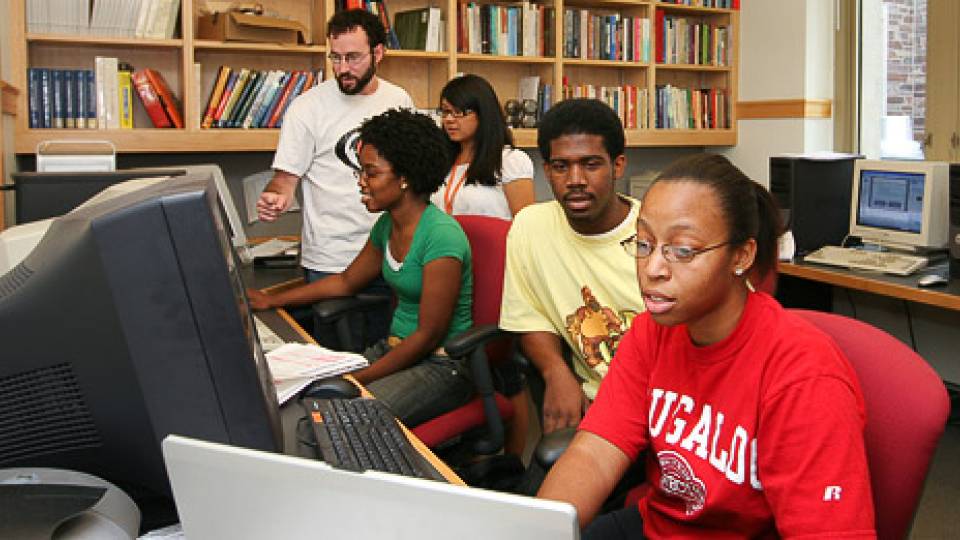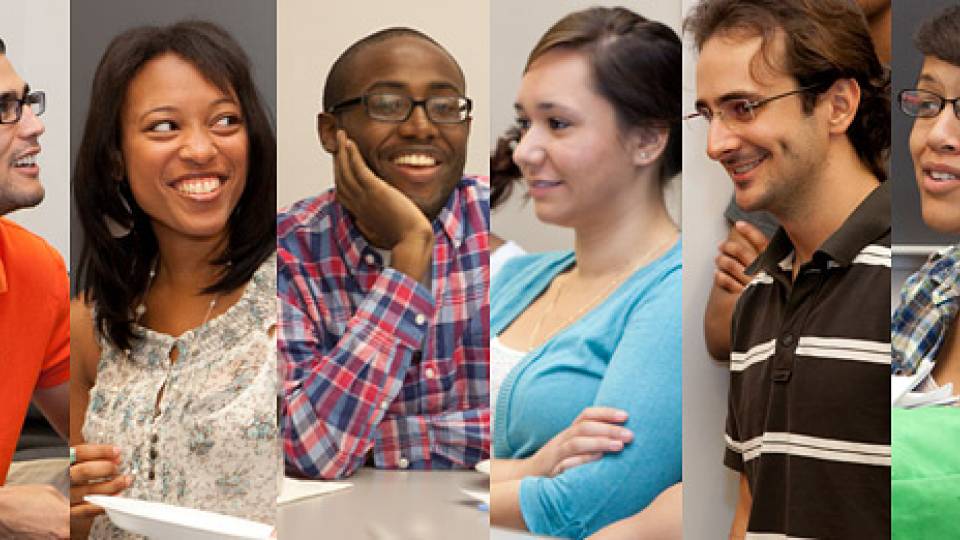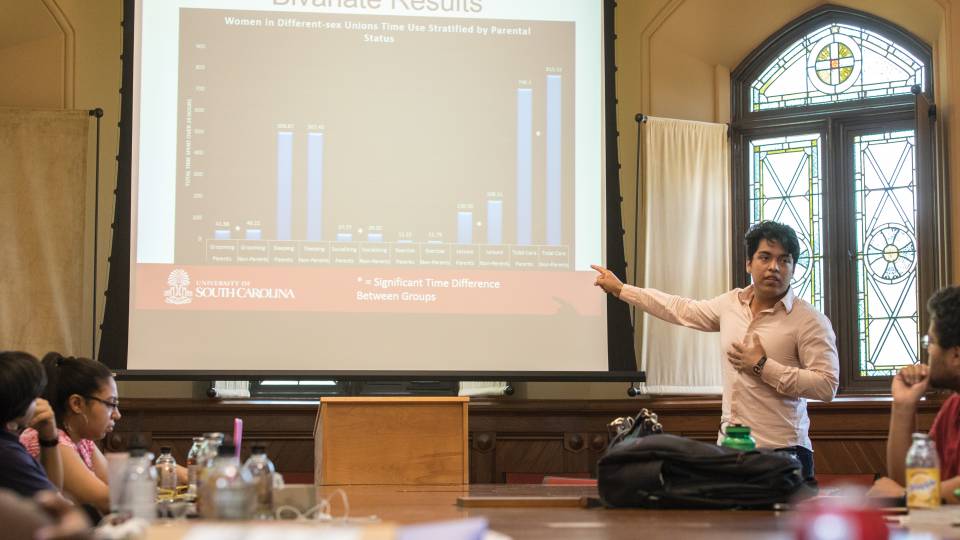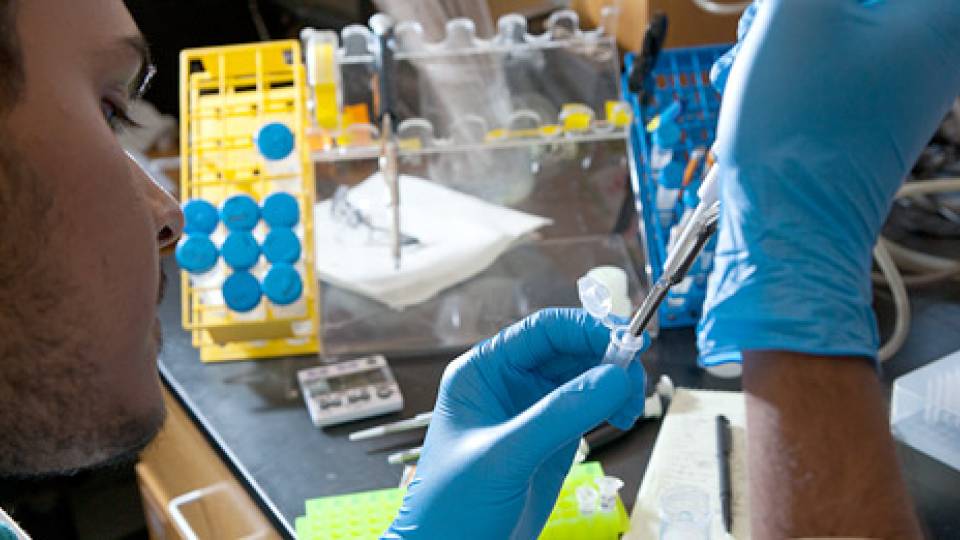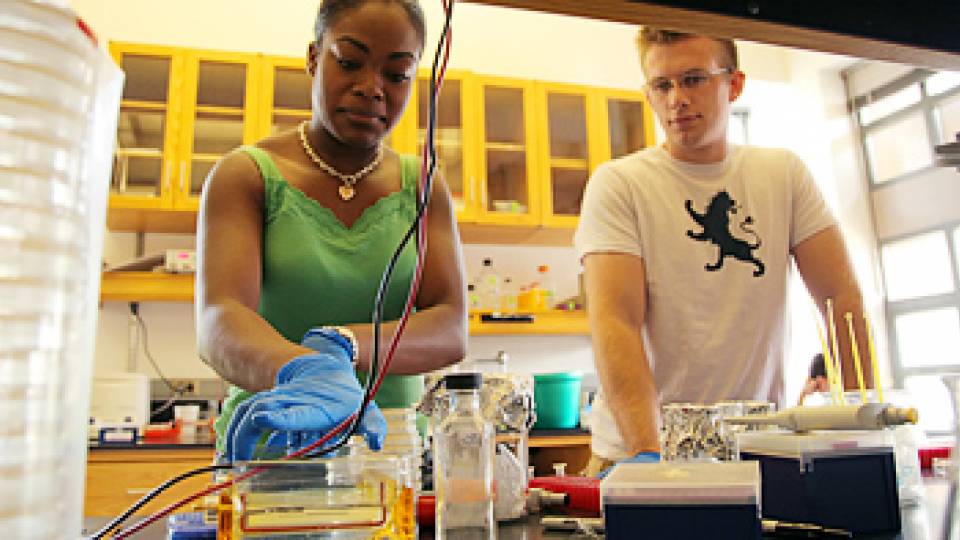In just eight weeks this summer on the Princeton campus, 14 college students from around the country are getting a real sense of how their lives may change over the next several years.
The students are taking part in the Princeton Summer Undergraduate Research Experience (PSURE), a program run by the Graduate School for students who are interested in pursuing doctoral studies. PSURE matches students with Princeton faculty, postdoctoral researchers and graduate students from several departments who mentor them on research projects, exposing the students to the intense independent research focus that is required of doctoral candidates.
The eight-week program, which runs through Aug. 7, is designed for undergraduates who have completed their sophomore or junior years and who express a serious interest in pursuing a Ph.D. and following a career in college or university teaching and research. Undergraduates who are underrepresented minorities, who are from socioeconomically disadvantaged backgrounds or who are from liberal arts colleges are especially encouraged to apply.
Brittany Rhodes, a rising senior at Spelman College, is working this summer in the laboratory of Steven Bernasek, a Princeton professor of chemistry, alongside Joshua Wnuk, a postdoctoral researcher at the University. Rhodes is focusing on making nanotubes of titanium oxide for use in developing lower-cost solar cells.
"This is brand-new to me, and I find it very interesting," she said. "One of the reasons I was interested in this program is that I wanted to do something outside of my current research, which is drug design, and I have really enjoyed it."
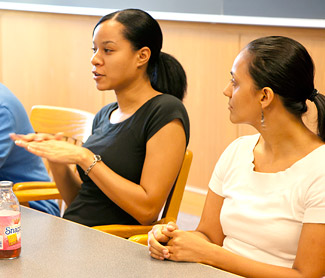
Doctoral candidates Ashley Crump (left) of the Program in Applied and Computational Mathematics and Monica Trujillo of the Department of Sociology provide insights into graduate student life during a roundtable discussion with other graduate students and the PSURE participants. (Photo: Denise Applewhite)
Along with introducing her to a new area in her field, Rhodes said the PSURE experience has opened her eyes to the rigor of doctoral studies.
"I knew it was going to be hard, but now I know that I have to make sure I have the support system that I need," she said. "Working with someone I can fit well with is going to be very important."
Two other PSURE students, Filomene Morrison and Fred Abban, have learned about the value of support systems during their work in the laboratory of Elizabeth Gould, a professor of psychology and the Princeton Neuroscience Institute.
Focusing on projects related to adult neurogenesis, which is the production of new neurons in the adult brain, Morrison is primarily working with Erica Glasper, a postdoctoral researcher in Gould's lab, and Abban is being mentored by Tim Schoenfeld, a graduate student. While the two undergraduates have been assigned separate projects, they have experienced the collaborative nature of advanced research in a busy laboratory, Gould said.
"I think it has worked out nicely for them because they could work together and on separate projects, so that got a little more energy going," Gould said. "That's really the way the lab works -- it's a group effort, because there's a lot to do. Things always work out better when you have more than one perspective."
Gould noted that both students became "involved in projects that were at a good stage; there were some preliminary data, but the whole story hadn't unfolded yet."
"So they get to see the process of discovery," she explained. "They also get to see the unglamorous side of science -- working long hours, working by yourself, trying to figure out a puzzle that is not readily apparent -- as well as the fun side of it."
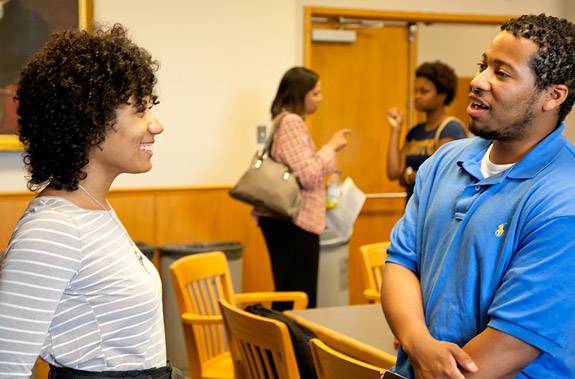
Lauren Lee-Houghton (left), a Duke University undergraduate, speaks with Jamol Pender, a graduate student in Princeton's Department of Operations Research and Financial Engineering, following the roundtable discussion. (Photo: Denise Applewhite)
Morrison, a rising senior at the University of California-Berkeley, said, "What I've been learning is to not be afraid of my own ignorance, to always ask questions and not be embarrassed. It's easy to feel intimidated, but there's no reason to. Research is a continual learning process that involves asking questions at all levels. I really was able to learn a lot about the entire process of research thanks to the supportive and understanding nature of the lab. Overall, the mentorship provided through the program has helped shaped my decision to apply to graduate programs in the fall."
Abban, a junior at Cornell University, said he has enjoyed his involvement in the lab's research. "Even if we only do a fragment of the research, we're still doing something fun and exciting," he said, adding that the experience will inform his decision-making as he applies to graduate school.
"You have to know what you're getting into. You can't just say, 'I'm done with college and now I'm going to grad school' without knowing what it entails," Abban said. "There's a lot about it that you have to know firsthand that I'm glad I got the opportunity to actually go through."
In addition to working on research projects with their mentors, the PSURE students attend lectures, discussions and activities to gain insights about other aspects of graduate school, including workshops on the application process, financial aid and the Graduate Record Examination standardized test. They also have visited other universities and practiced presenting their research at the annual symposium of the Leadership Alliance, a consortium of student summer research programs, held July 30-Aug. 1 in East Brunswick, N.J.
Karen Jackson-Weaver, associate dean for academic affairs and diversity in the Graduate School, leads the PSURE program along with Elaine Willey, the school's academic affairs specialist. Weaver said Princeton faculty members across the disciplines have been very supportive of the effort to mentor the PSURE students.
"A number of new Princeton faculty served as faculty mentors this year, and I am hopeful that we will continue to foster that same level of enthusiasm and support in future years," she said.
Ashley Crump, a Howard University alumna who is now a doctoral student in Princeton's Program in Applied and Computational Mathematics, is serving as a graduate mentor for all of the PSURE students along with Monica Trujillo, a doctoral candidate in the Department of Sociology.
"Mentorship has played a critical role in the progress of my academic career," Crump said. "I have experienced firsthand how the involvement of a mentor can pave the way for success. Becoming a mentor with the PSURE program is a way for me to impact students' lives in the same way others have done for me."
Crump emphasizes to the PSURE students the value of collaboration and support in succeeding on the path to a Ph.D.
"I have learned that all areas of research -- reading, writing, data mining, analyzing, etc. -- are accomplished most effectively when we actively engage others in the process," she said. "We need to have a continual dialogue with advisers, mentors and peers. I hope that our participants leave this summer knowing the significance of creating their own research communities."
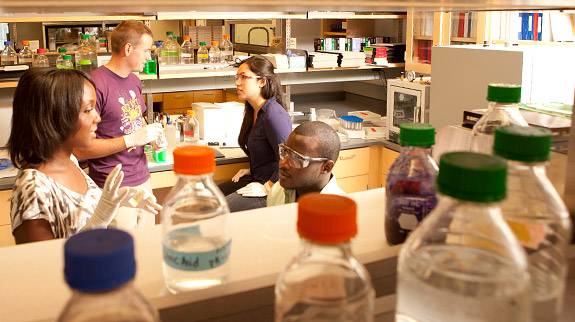
Two PSURE students are working this summer with Princeton mentors in the laboratory of neuroscientist Elizabeth Gould. In the foreground (from left), postdoctoral researcher Erica Glasper discusses lab work with Cornell University student Fred Abban. In the background (from left), graduate student Tim Schoenfeld talks with University of California-Berkeley student Filomene Morrison. (Photo: Brian Wilson)
